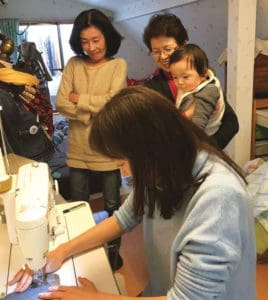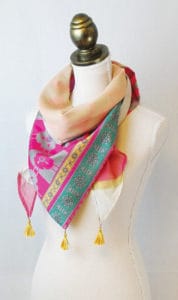From childhood, I’ve always wondered why Japan is rich while other countries are poor. I think it’s because I was raised in a Buddhist family. I was always quite aware of the poverty around me and, over time, wanting to do something to help people in need, I decided to spend ten months working in an orphanage and a social center in the Philippines after my graduation.
I studied apparel and textiles at university, and I wondered if there was a way I could put my talents at the service of the needy. The industry I was preparing to work in catered to the rich, and that felt like a contradiction to me. So by the time I came back from the Philippines, I had lost interest in fashion. Searching for another job, I soon realized that what I was actually looking for was something deeper and more meaningful for my life.

My search brought me to Italy first, where I spent some time learning about the spirituality of the Focolare Movement. There, I found out about the Economy of Communion project, and was immediately captivated. With the project, I discovered a business style aimed at social inclusion and the fight against poverty, and inspired by a culture where “there is more joy in giving than in receiving.”
I felt the call to become a fashion entrepreneur and that brought me to India next, where I fell in love with their beautiful fabrics. I was in Coimbatore to attend the United WorldWeek, an annual youth event aiming for peace and unity, and I experienced social work with Shanti Ashram, a Hindu organization whose members live according to Gandhi’s teachings. After that event, I remained in Coimbatore to buy fabrics.
My new Hindu friends supported me doing all this work and, more importantly, welcomed me as if I were a part of their family. Back in Japan, I started creating scarves out of those fabrics traditionally used for saris and kurtis (types of South Asian garments), and in 2016, I launched “Prima Luce” (First Light).
With every purchase from Prima Luce, customers also contribute to a humanitarian cause as an Economy of Communion business, Prima Luce gives part of its profits to NGOs.
Giving is one of the most important practices in Mahayana Buddhism. Its major teaching, Six Perfections, are “giving,” (布施) keeping the precepts, (自戒) “perseverance,” (忍辱)
“diligence,” (精進) “meditation,” (禅定) and “wisdom” (智慧). “Giving” is the most important because, if you practice it with compassion, you live all the 6 perfections to the end.
Buddha says “giving” also means to give something intellectual and practical. For example, giving the knowledge you’ve learned, advice on the true wisdom, and skills or talents you possess. And something concrete with an action, too. For example, there is a teaching called “wagen aigo” (和顔愛語 ). It means a gentle face and a kind word. They say if you practice “wagen aigo” (和顔愛語), it brings great graces and merits even though it might be a small act, because with it, you can make someone cheerful and bring about a warm atmosphere.
So the activity of Prima Luce also tries to respond to the problems which Japanese society is facing; that is spiritual poverty which reveals little solidarity and a mind that only cares about its own.
Sometimes, I hold workshops in Prima Luce’s atelier where sewing machines, tools and materials are prepared. I invite various friends. This workshop has adopted a café style so the participants can feel at home and make new friends sharing their interests, problems, or whatever, and they can create things like bags or aprons and repair their clothes, too. Most of them are there for the first time to make those things using a sewing machine so I help them with the product from the beginning to the end.

I do all this for free. Sometimes people ask me, “Why don’t you charge for this workshop since you are teaching skills, giving materials and allowing them to use machines?” But my answer is that I want to share my time, my belongings and my talents. I think this kind of attitude makes people aware that there is a different way to live.
I have a friend who once participated in the workshop. She has quite a tough background because she had to divorce her husband and leave behind her small daughter. I decided not to judge, but to just be with her and pray for her true happiness, so in the workshop I suggested to her to make a bag for her daughter to use in kindergarten. It was almost the first time for her to produce a handmade bag. I tried to be with her so that she could make a gift for her beloved daughter. The following day she sent me a photo of her daughter holding the bag, with a message declaring that she was happy as a mother that her daughter was so happy to receive her love.




